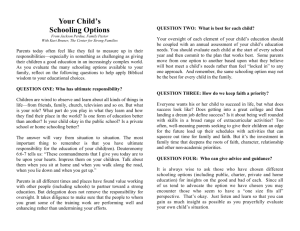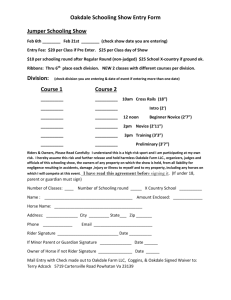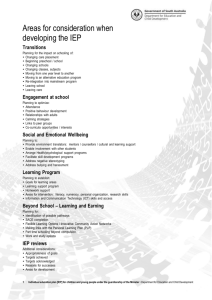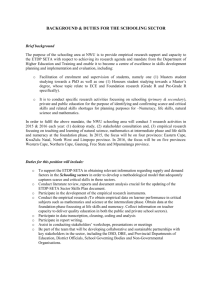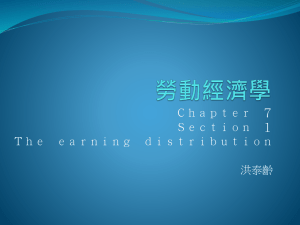Purpose of Schooling Purpose of Schooling Paper Final Fairon
advertisement
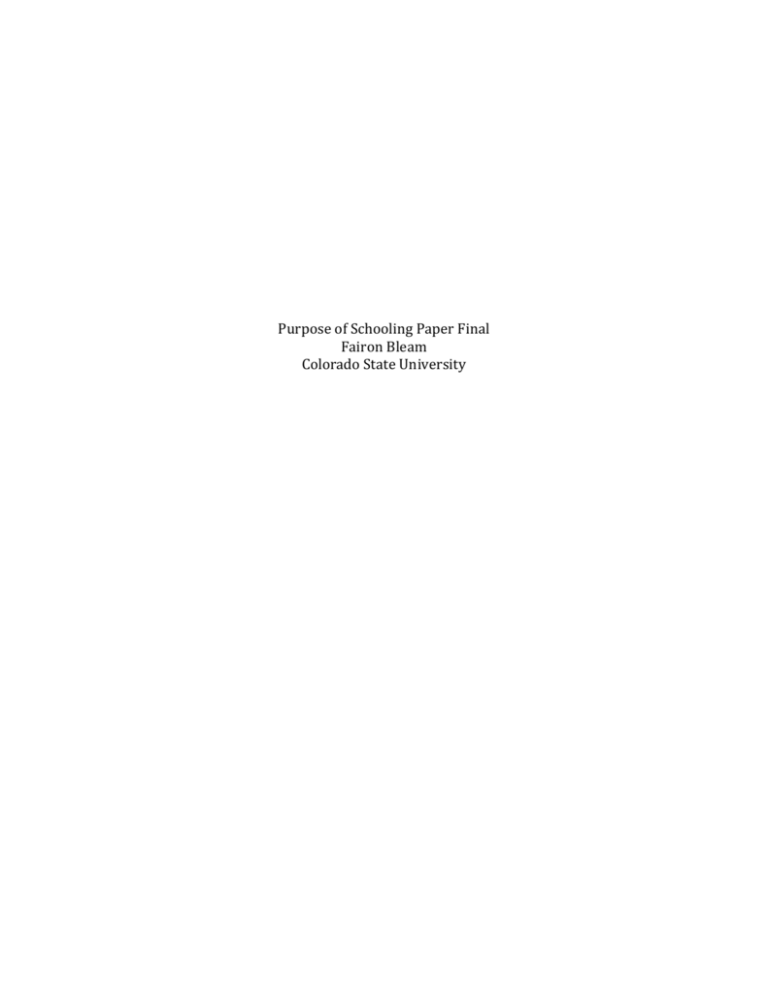
Purpose of Schooling Paper Final Fairon Bleam Colorado State University Purpose of Schooling 2 Meta-Reflection on Process: When I went back and read my paper from the beginning of the year, I was amazed at how much I have learned. After my various course readings, classroom discussions, quizzes, games, and on-line discussions, my knowledge of this course has drastically improved. I find myself questioning things more and especially listening to others ideas and questions as well. I’ve learned so much from this class and my classmates it’s almost unreal, but extremely exciting. My final paper was almost entirely influenced by our class discussions and readings. All that I have learned this semester is reflected in my paper, and I hope to write this paper again at the end of my teaching classes to see how much I’ve grown even further. Purpose of Schooling 3 What was, is, and should be the purpose of schooling in the United States? First and foremost the most important purpose in schooling is education. Making sure that students have the upmost learning experience possible is key. When students are eager to go to school because they know it’s a safe environment where their ideas are expanded, their learning is at an all time peak. The purpose of schooling is to make sure everyone gets an education to his or her specific learning style. As teachers, our jobs will to make sure that each students’ need are met seeing how no one student is the same. Multiculturalism is a great way to understand various cultures, values, and beliefs of each individual student. “When educators acquire a multicultural ideology and conception of U.S. culture, they are then able to view the experiences and contributions of a wide range of cultural, ethnic, language, and religious groups as significant to the development of the United States (Banks, 227). This is an important concept to be aware of and leads up to an opening for dialogical pedagogy. If students are able to feel comfortable around their peers and express ideas openly, they are even more engaged into their learning. Lastly the sole purpose of education is the heart and soul that comes from each individual. Not just the students, but also the administration, teachers, parents, coaches, and every person that makes up the community. According to the Dalai Lama, “What is the purpose of our life? Of course, I believe that it is happiness.” This can also reflect to schooling. If education is fun and pushes the student to be all that they can be and are surrounded by happy people, that truly is a sole purpose of successful schooling in the United States. What is your role as a future teacher in fulfilling that purpose? After explaining the purposes of schooling in the United States, as a future teacher there are many roles that I will partake in to fulfill these purposes. Teachers wear various Purpose of Schooling 4 hats that they will find themselves switching to each and everyday. “As we are rolling into the twenty-first century, we see the role of teachers changing. They not only provide subject-area instruction to students but also offer counseling, test-taking strategies, technology education, and job training, all the while preforming administrative duties, completing program evaluations, meeting teacher licensure requirements, engaging in community outreach activities, and mentoring novice teachers” (Huerta, 62). Also as a teacher, it is my responsibility to make sure that each and every student feels welcome and safe in my classroom as well as in the school. Creating an environment that collaborates around dialogical pedagogy will be a key aspect. “A democratic view of education demands a relationship between teachers and students in which dialogue is a crucial means for learning because it not only draws from and contributes to the education of the individual but is the foundation of a democratic society” (Fernandez-Balboa, 39). Creating a classroom with all of this will also entail the soul to take place. What do I mean by soul? I don’t mean that I will be preaching about church inside my classroom, but more with tones, gestures, and a sense of feeling. When teachers show their human side to students, they tend to respect teachers more and have a common understanding of each other; at least that is how it was for me. If my job only consisted of coming in and teaching students about my content area, I would lose interest instantly. According to Kessler, when soul enters the classroom, masks drop away (5). She states that students dare to share the joy and talents they have feared would provoke jealousy in even their best friends (5). They risk exposing the pain or shame that peers might judge as weaknesses (Kessler, 5). Seeing deeply into the perspective of others, accepting what has felt unworthy in him or her, students discover Purpose of Schooling 5 compassion and being to learn about forgiveness (Kessler, 5). These will all be vital in my role as a future teacher. How does school continue the existing order? As our role of a teacher is vital to schooling, it is evident that schooling will always partly continue in the existing order. Being able to educate various students with different backgrounds, beliefs, and values can be challenging. The existing order now is struggling to continue its route towards equality. According to Joel Spring, “Despite the current confusion over racial categories by government officials and among recent immigrants, the concept of race and racial discrimination remains alive among groups who from the eighteenth century faced the hardships of discriminatory state and federal laws and attempts at deculturalization” (142). This statement clearly explains how even though our nation strives for equality, there are still various hardships that we have yet to overcome. As a student attends school, they also are there to learn the basics of what it takes to be successful in the world. They will learn people skills, core-curriculum, and other things such as being on time to class or handing a paper in on its necessary date. The routine of an everyday school is continuing now in the existing order. How can schooling transform the existing order? Since the same routine is continuing, now I lean towards the question of how can we change and make schooling even better? As I stated earlier in this paper on our role as teachers, I believe that classrooms can even further develop dialogical pedagogy. I truly believe that our schooling can keep increasing our ideas even further by simple talking to classmates and trusting them. To expand on this, knowing others values, beliefs, and cultures can help open each others eyes to differences that are among us. Not one person is Purpose of Schooling 6 exactly the same, and it’s interesting and informative to hear and learn where others are from. As our schools continue to transform, we can be sure to overt our own racial, social, cultural, and political biases. As teachers, we can educate our students about all different races, cultures, and political backgrounds so they can decide for themselves. Setting out the facts, and then having students form their own opinions is how each of them will be successful in their own way. Forcing them to believe something is going to get them nowhere. As we continue to transform the existing order, it will take ourselves to be learners as well; it will take us to be open to all sorts of new ideas that our students will have, and no remaining stuck on what was once in our history. 7 Purpose of Schooling References Banks, J. (2001). Approaches to multicultural curriculum reform. In Banks, J. & Banks, C. (Eds.), Multicultural Education, 227. New York: Wiley. Dalai Lama (1999). Education and the human heart. In Glazer, S. (Ed.), The heart of learning, 85. New York: Putnam. Fernandez-Balboa, J. & Marshall, J. (1994). Dialogical pedagogy in teacher education. Journal of Teacher Education, 39. Huerta, Grace C. (2009). Educational Foundations: Diverse Histories, Diverse Perspectives. In Houghton Mifflin Company. Chapter 3: Entering the Teaching Profession, 62. Massachusetts: Boston. Spring, Joel H. (2010). Deculturalization and the Struggle for Equality: A Brief History of the Education of Dominated Cultures In the United States. In McGraw-Hill Companies. Chapter 7: Twenty-First Century: A Post-Racial Society?, 142. New York: New York. Kessler, R. (2000). The soul of education. Alexandria, VA: Association for Supervision and Curriculum Development.

